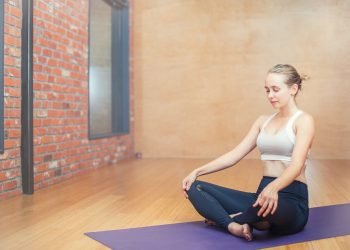Conquer Anxiety with Mindfulness: A Path to Peace and Calm
Anxiety is a common mental health issue that affects millions of people around the world. It can manifest in various forms, such as generalized anxiety disorder, phobias, panic attacks, and social anxiety. Dealing with anxiety can be overwhelming and debilitating, but there is hope. One approach that has gained popularity in recent years is mindfulness.
What is Mindfulness?
Mindfulness is the practice of bringing one’s attention to the present moment in a non-judgmental way. It involves focusing on your thoughts, emotions, and sensations without getting caught up in them or reacting impulsively. Mindfulness can help you become more aware of your internal experiences and external environment, leading to greater clarity, peace, and calm.
One of the key principles of mindfulness is acceptance. Instead of trying to change or control your thoughts and feelings, you learn to accept them as they are without judgment. This can be incredibly empowering, as it allows you to observe your anxiety without getting swept away by it.
How Does Mindfulness Help with Anxiety?
Mindfulness has been shown to be an effective tool for managing anxiety and reducing its symptoms. By practicing mindfulness regularly, you can develop a greater sense of self-awareness, emotional regulation, and resilience. This can help you cope with stressful situations more effectively and prevent anxiety from spiraling out of control.
One of the key benefits of mindfulness for anxiety is its ability to help you stay grounded in the present moment. Anxiety often stems from ruminating about the past or worrying about the future. By focusing on the here and now, you can prevent your mind from getting stuck in a cycle of negative thoughts and emotions.
How to Practice Mindfulness for Anxiety
There are many ways to incorporate mindfulness into your daily routine to help manage anxiety. Here are a few simple practices you can try:
Mindful Breathing
Take a few moments to focus on your breath. Notice the sensations of breathing in and out, paying attention to the rise and fall of your chest or abdomen. If your mind starts to wander, gently guide it back to your breath.
Body Scan
Lie down in a comfortable position and bring your awareness to different parts of your body, starting from your toes and moving up to your head. Notice any tension or discomfort, and allow yourself to relax as you breathe into each area.
Mindful Walking
Take a slow, deliberate walk while focusing on each step you take. Notice the sensation of your feet touching the ground, the movement of your muscles, and the sights and sounds around you. Walking mindfully can help you connect with your body and environment, grounding you in the present moment.
Benefits of Mindfulness for Anxiety
There are many benefits to incorporating mindfulness into your routine to help manage anxiety:
Reduced Stress
Mindfulness can help you relax your body and mind, reducing the physical and emotional symptoms of stress. By staying present and centered, you can better cope with stressful situations and prevent anxiety from escalating.
Improved Emotional Regulation
Practicing mindfulness can help you become more attuned to your emotions and respond to them in a balanced way. Instead of reacting impulsively to anxiety triggers, you can pause, observe, and choose how to act mindfully.
Enhanced Self-Awareness
Mindfulness can help you become more aware of your thoughts, feelings, and behaviors, allowing you to identify patterns and triggers that contribute to anxiety. By developing self-awareness, you can cultivate a sense of empowerment and agency over your mental health.
FAQs About Mindfulness and Anxiety
Q: Can mindfulness cure anxiety?
A: While mindfulness is not a cure for anxiety, it can be a powerful tool for managing its symptoms and reducing their impact on your life. By practicing mindfulness regularly, you can learn to navigate anxiety more effectively and cultivate a greater sense of peace and calm.
Q: How long does it take to see the benefits of mindfulness for anxiety?
A: The benefits of mindfulness for anxiety can vary from person to person. Some people may notice improvements after just a few sessions, while others may require more time to experience significant changes. Consistency and patience are key when practicing mindfulness for anxiety.
Q: Can I practice mindfulness if I’m already feeling anxious?
A: Absolutely! Mindfulness can be a helpful tool for managing anxiety in the moment. When you’re feeling anxious, try focusing on your breath, grounding yourself in your body, and observing your thoughts and sensations without judgment. This can help you calm your mind and body, reducing the intensity of your anxiety.
Conclusion
Anxiety can be challenging to navigate, but with the practice of mindfulness, you can find a path to peace and calm. By cultivating self-awareness, emotional regulation, and resilience through mindfulness, you can learn to manage anxiety more effectively and lead a more fulfilling life. Incorporate mindfulness into your daily routine and start experiencing the benefits for yourself. Remember, mindfulness is not a one-size-fits-all solution, so feel free to explore different practices and find what works best for you. Embrace the journey towards peace and calm with mindfulness by your side.
Start your mindfulness journey today and take the first step towards conquering anxiety and finding inner peace. Your mental health and well-being are worth the investment of time and effort in practicing mindfulness. Remember, small steps can lead to significant changes over time. Embrace the practice of mindfulness with an open heart and mind, and watch as the benefits unfold in your life.
















































